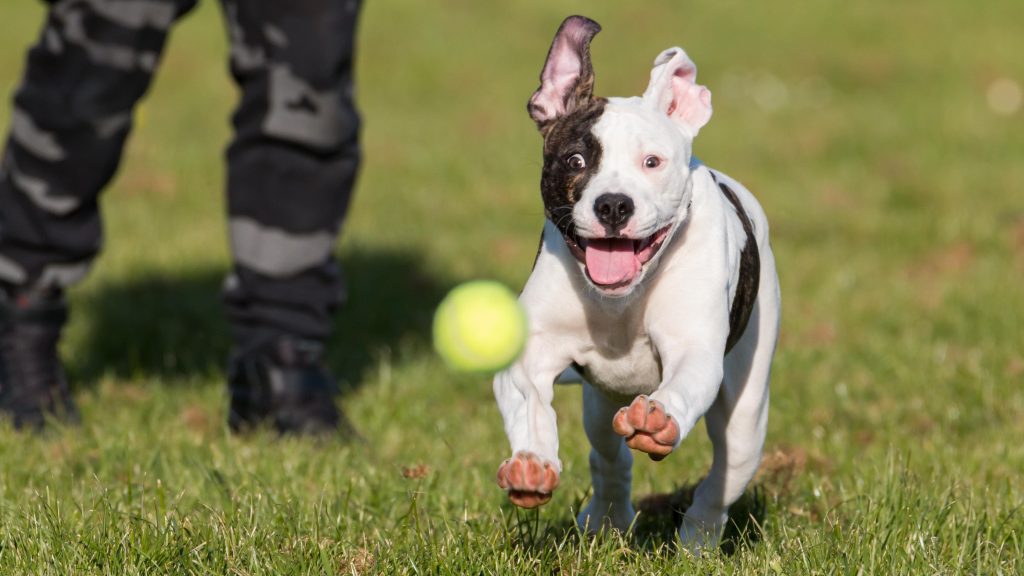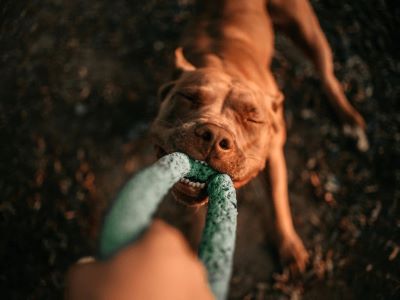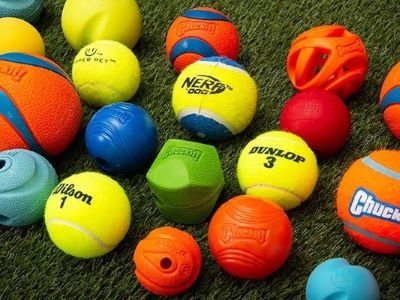You must’ve noticed your dog going absolutely crazy for the ball. They keep dropping the ball in front of you when you’re busy, and their puppy eyes beg to play. And when you do give in, it seems as though your pet is in a trance and never wants to stop. You wonder: “Why Do Dogs Love Balls?”
Let’s tackle this love and find out its origins.

Why Do Dogs Love Balls?
We often forget this four-legged, cute, domesticated creature has evolved from wolves. Thus, dogs naturally have their primal hunting instinct. So, when they see a ball, that jumps and runs away from them and squeaks! Their instinct kicks in and they naturally chase the ball and grab it with their mouth.
Dogs find chewing to be a calming activity. It releases “feel-good” chemicals in their heads. Fetch also makes for a good bonding experience. The act of retrieving the ball makes the dog feel useful and as though they have accomplished a task.

Other factors come into play, such as the colour of the ball. Dogs are dichromatic which means they can see only two colours: Yellow and Blue. You may have noticed that your pet has difficulty playing with red chew toys or tug toys, that’s because red appears brownish and it blends with the environment. So, the next time you’re at the pet store, make sure to get only yellow and blue toys.
When It Turns Into Obsession
It will seem after a while as though your dog is obsessed with their ball. They go into a trance-like state and have a hard time understanding that the game is over for today. They may whine or start barking, the obedient dog disappearing. This can be hard to deal with.
Whenever there are guests, your pup drops the ball in front of them, hoping for a game. And the guests find this behaviour adorable and give in to the dog’s demands. This reinforces bad behaviour, that their persistent demands will be rewarded.
There are a few steps you can take to counter this and to help your dog have a positive relationship with the ball.
How To Deal With Dog’s Ball Obsession?
You will have to develop a thick skin to help your dog. This means knowing when to say “no” and “stop”. You can start training by introducing new toys and games to your pet. Games like tug of war can be played indoors and is just as engaging as a game of fetch.

Set up a schedule and follow it. Make sure that your pet knows that the game starts when you say. After the game finishes, state in a firm voice: “Finish”. Reward your doggy when they calm down. The aim is to set it straight that the game starts and ends with you.
You can give your dog other toys to keep them occupied such as chew toys, food dispensing toys or food puzzles. These are more indoor activities and activities that they can engage in without you.
Variety Of Balls And Preferences
When selecting a ball for your pet, ensure that the size of the ball is big enough that they don’t swallow but not so big that your dog can’t grab it.
It is suggested to get rubber balls over tennis balls as rubber is natural. The fur on the tennis ball can prove to be toxic[1].

When purchasing any kind of toys, ensure they are in yellow or blue colour as they are the only colour visible to our pet. It is also a good idea to get balls that squeak for young pups. This will encourage them to play more.
Breanne Long from AKC states: “Generally speaking, most dogs like toys that simulate prey. This is why squeaky toys and soft toys are often very popular with most dogs. Hearing the high-pitched squeak and/or ripping apart a soft plush toy can be immensely satisfying to some dogs.”
FAQs
Why do dogs love balls?
A huge factor is that chasing a ball appeals to your dog’s primal instinct. A ball running away from the dog, squeaking away, seems like a prey. Playing fetch also creates a strong bond between the owner and the pet. The act of retrieving the ball gives your pet a sense of purpose and accomplishment.
Is it good for dogs to chase balls?
Everything is good in moderation. If your pet is aged, it is best to not drag the game long and play in short bursts. It can also cause behavioural changes. Your pet can become persistent and too excited to play fetch. This can cause a disturbance in your schedule.
Why does my dog cuddle with her ball?
Dogs can get very attached to their toy and thus become possessive of their toys. They may seek comfort by cuddling with the ball due to the positive and bonding experiences they have associated with it.
Is it bad for dogs to chew on balls?
Certain balls, like the tennis ball, have fur on it which can prove to be toxic if consumed. It is advised to play with rubber balls, they are not harmful if consumed. Also, make sure to get balls that are blue or yellow as they are the only colours visible to your pet.
How long should I play ball with my dog?
It is recommended to play in short bursts. A typical session of fetch should be around 5-10 mins. You can then play other games or go for a walk. A long game of fetch can cause trauma to your pet’s joints.
Conclusion
Some dogs genetically know that they have to chase the ball while others require some encouragement. Whatever it may be, playing fetch with your puppy is the best bonding experience. It takes trust to retrieve the ball.
In this article, we aimed to answer: “Why Do Dogs Love Balls?” It is due to their primal instinct that has remained the same through years of evolution. We hope you have a good game of fetch!
References:
- Are tennis balls safe for dogs? American Kennel Club.



